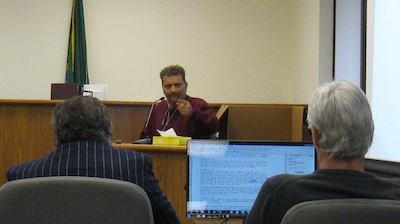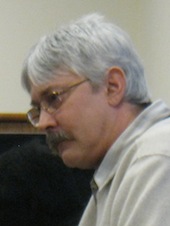
Donald A. Burgess Sr. talks about December 1985 conversation in Randle.
By Sharyn L. Decker
Lewis County Sirens news reporter
CHEHALIS – It was three or four days after what happened to the Maurins hit the news.
Donald A. Burgess Sr., a drug dealer who’d been injured at his job at a Randle mill that summer was at home with casts on both legs, he testified.
Burgess told of a day a friend came by his place on Savio Road, either to buy or to sell drugs. He wasn’t expecting it, but Scott Gilstrap had brought along Rick Riffe, he said.
And as the conversation turned to the elderly Ethel couple who were killed, Riffe made a comment acknowledging he was involved, according to Burgess.
“I think we’re gonna get away with it,” Burgess recounted. “It’s gonna get bypassed.”
On the witness stand yesterday in Lewis County Superior Court, Burgess described how he immediately kicked the two men out of his home.
“I tell him to get this piece of shit out of my house and never bring him back,” he said.
Burgess’s testimony came at the end of the day, in the trial that began early this month.
Riffe, 55, is charged with burglary, kidnapping, robbery and murder of Ed and Minnie Maurin, the elderly Ethel couple whose bodies were found on Dec. 24, 1985 dumped on a logging road, with shotgun wounds in their backs five days after they went missing. Riffe, who moved to Alaska in the late 1980 with his brother, was arrested last year and brought back to Lewis County. His younger brother, also a suspect, died before he was charged.
“He said ‘we’, that’s his exact words,” Burgess testified.
Jurors have heard from dozens of witnesses in the lengthy trial.
Many have told of seeing the Maurin’s 1969 Chrysler with a man in its backseat in areas between the couple’s home and to the north. They have heard Ed Maurin was at his bank in Chehalis withdrawing $8,500. There were sightings of the car in the Adna area where subsequently the bodies were discovered. And many have told of seeing a man or men in a green Army jacket and a dark cap carrying a shotgun or rifle away from the Yard Birds Shopping Center where the car was abandoned.
Some who knew Rick and John Gregory Riffe from the Mossyrock area have testified when a composite sketch was disseminated back then, they right away thought it looked like the Riffes.
Burgess’s testimony is the first in which a person who knew him testified Rick Riffe indicated he was involved.
Burgess thought Riffe’s comment was meant to “boost” himself up in the eyes of a fellow drug dealer, he said.
Six or seven times over the years, police have asked Burgess if he knew anything, but he didn’t talk, according to Burgess.
He decided after Riffe was locked up, he would, he said. And he finally lost his fear of ratting out someone.
In part, that’s because he’s slowly dying from heart and lung disease so it doesn’t matter anymore, he said. He carried a small bag with oxygen with him to the witness stand.
Early on the case, prosecutors took videotaped testimony from Burgess as a heart attack left them concerned he would not live to see the trial.
Back then, Burgess and others bought and sold cocaine, methamphetamine and marijuana, according to Burgess.
He recalled he might for example, a couple times a month sell Rick Riffe a half ounce of cocaine which ran somewhere between $500 and $700.
With that amount, if broken down and resold, a person could almost triple their profit in one weekend, he testified.
The drug selling relationship was over a couple, three maybe or a four year period, he said.
When Gilstrap and Riffe came to his home that day, he and his circle of friends already knew the Riffes had done it, according to Burgess. It wasn’t clear if the visit occurred after the car was found with a blood-soaked front seat, or days later after the bodies turned up.
Defense attorney John Crowley questioned Burgess about his motivation to tell the story he did. He suggested the witness had a deal which would help out his daughter who was locked up last year after pleading guilty to killing her premature newborn.
Burgess was clearly distressed, breathing through his mouth, and even the judge asking if he could “hold on a little longer.”
The jury was sent out while lawyers argued to the judge about the mention of Laura Hickey, and Lewis County Senior Deputy Prosecutor Will Halstead complaining Crowley was badgering the witness.
Burgess then finished the last 10 of 50 minutes of testimony, and was done.
The trial resumes at 9:30 a.m. today at the Lewis County Law and Justice Center in Chehalis.


 Join us
Join us
Guest column: Suspension for arrested deputy explained
Wednesday, October 30th, 2013By Steve Mansfield
Lewis County sheriff
Recently, one of my employees, while off duty, was arrested for driving under the influence. The occurrence has received significant media and public attention.
The circumstances in this event fortunately involved neither property damage nor injury to others.
Lewis County Sheriff Steve Mansfield
Had it involved a common citizen, it likely would have received only minimal media attention if any at all. However, since it involved an off-duty officer who is sworn and empowered to enforce and uphold the laws of this state, including DUI’s, it was considered news-worthy, and a topic of discussion in our community.
This is a legitimate interest which I do not dispute. I even had some inmates I was supervising on a work crew over the weekend inquire about the situation. One even claimed to have been arrested by this employee for DUI.
Many of the comments and inquiries center on whether the employee will face the same penalties and accountability an ordinary citizen arrested for DUI would, or will he be treated differently because of his law enforcement status.
Just to be perfectly clear, the employee will receive no preferential treatment under the law nor any leniency in meeting legal requirements than what would be afforded to any other citizen arrested for DUI.
What may likely be very different from what most citizens would experience in their employment are the administrative sanctions imposed by my office.
Years ago when I first became a deputy, an incident like this would end a career with few questions asked. Today’s labor laws and union contracts afford greater protection to employees by ensuring due process is followed and discipline is only imposed in accordance with the principles of just cause.
Labor contracts also have grievance provisions that can ultimately take final disciplinary decisions out of the hands of management and put them into the hands of the Civil Service Commission, arbitrators, or superior court judges.
I typically refrain from voluntarily disclosing details of disciplinary action taken within my office, but I feel the circumstances of this case warrant such disclosure.
In looking at the totality of this situation and the employee’s exemplary performance over the past 12 years, the administrative sanctions imposed included a two week unpaid suspension from duty, removal from his current position as detective and a last chance agreement that ties his continued employment directly to the conditions imposed by the court.
I believe many of the problems we deal with today exist in part, because we have lost so much of the social accountability that we once had in the past. This is not just accountability that emerges from media attention, but more importantly accountability that originates in and is enforced by our families, friends, schools, churches and organizations to which we belong.
Regardless of one’s profession, religion, sex or race, we are all human, and we are all susceptible to making mistakes and bad choices. When alcohol is involved, it seems mistakes and bad choices are all too often the end result.
Despite our intense focus on education and enforcement, DUI still continues to destroy families, careers and compromises safety and security within our communities.
As a society, we hold those who break the law accountable for their actions.
You as citizens naturally and rightly expect and demand those of us who are sworn to protect and enforce the law, to obey those laws and be held just as accountable for our actions.
That social expectation is extremely influential in motivating us to achieve our mission, uphold our oath of office and code of ethics, and to protect and serve you in a manner that fosters trust, is responsible, respectful, fair and caring.
My employee made an extremely poor, unacceptable decision when he chose to drink, get behind the wheel of his vehicle, and drive down the roadway. It is a decision over which he is extremely embarrassed and sincerely regrets.
He is now being held accountable for that mistake.
It is my hope this employee turns the negative of this experience into something positive and constructive that ultimately leads to him being a better employee, a better citizen, and a father his family can look up to.
He has recommitted himself to me that he will fulfill our mission and uphold his oath of office and code of ethics as he carries out his duties and responsibilities in serving you, the citizens of this county.
Not everyone earns, deserves, or is afforded a second chance. It is my expectation, not only as your sheriff, but also as a citizen, that he earns and proves himself worthy of this opportunity.
•••
For background, read “Lewis County sheriff’s deputy pleads not guilty to DUI” from Friday September 13, 2013, here
Posted in Columns and commentary | 28 Comments »